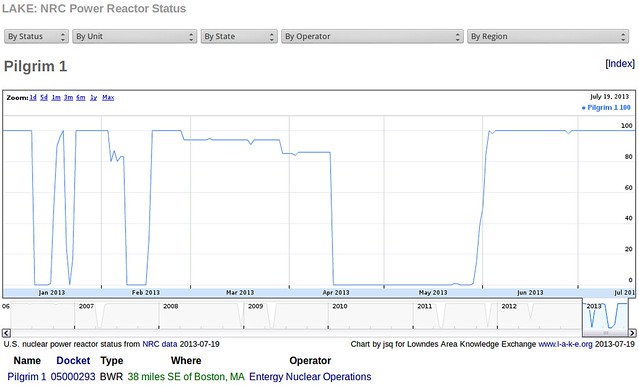Down in January, February, April, May, running low March and June, and now likely to go down because of summer heat, under what conditions does Entergy’s Pilgrim nuke near Boston, MA like to run? Entergy also couldn’t keep the power on during the Super Bowl and still has Arkansas Nuclear 1 down since a fatal accident in March. To be fair, many nukes can’t handle heat. Remind me, why are we building more of them?
Christine Legere wrote for Cape Cod Times 18 July 2013, Seawater temps too high for Pilgrim cooling,
PLYMOUTH — The ongoing heat wave could force Pilgrim Nuclear Power Station to shut down, as soaring temperatures continue to warm the Cape Cod Bay waters that the plant relies on to cool key safety systems.
Pilgrim’s license from the Nuclear Regulatory Commission requires the water being drawn from the bay to be no warmer than 75 degrees. On Tuesday night, the temperature in the saltwater system reached 75.3 degrees and remained above the 75-degree limit for about 90 minutes.
If water temperatures rise and show no sign of lowering, the plant has 24 hours to completely shut down.
“The water temperature will be closely monitored as the heat wave persists,” NRC spokesman Neil Sheehan wrote in an email.
The temperature of seawater being drawn from the bay must be low enough to cool the water circulating around the reactor and transform steam from the system back to liquid water.
Although the seawater is warmer when it is discharged back into the bay, it must not be so warm it affects the ecosystem.
The plant produces 680 megawatts of electricity, according to Carol Wightman, spokeswoman for Pilgrim’s owner-operator, Entergy Corp.
“That is enough to provide power to about 680,000 homes and about 15 percent of the electricity used in Massachusetts,” Wightman said.
When asked whether Pilgrim has ever been forced to shut down because of rising water temperatures in the bay, Wightman said, “I don’t recall ever having to shut the plant down for this.”
Well, get used to it:
The rise in ocean temperatures is believed to be related to worldwide climate change. The U.S. Department of Energy issued a lengthy report this month on the impacts of climate change on air and water temperatures and how those changes affect energy producers such as power plants.
“Nobody ever predicted the water temperatures would go up this high in the Northeast when the plants were designed in the 1960s,” said NRC spokesman Neil Sheehan.
Cape Cod Bay water temperatures stayed above the 75 degree maximum for 5 1/2 hours Wednesday, topping out at 75.4 degrees, according to Pilgrim’s notification to the Nuclear Regulatory Commission late Wednesday afternoon.
With solar panels, hot weather means a few percent less efficiency and often more power because of more sunshine.
-jsq
Short Link:

Pingback: Nuke supervisor arrested for falsifying safety records at Indian Point | On the LAKE front